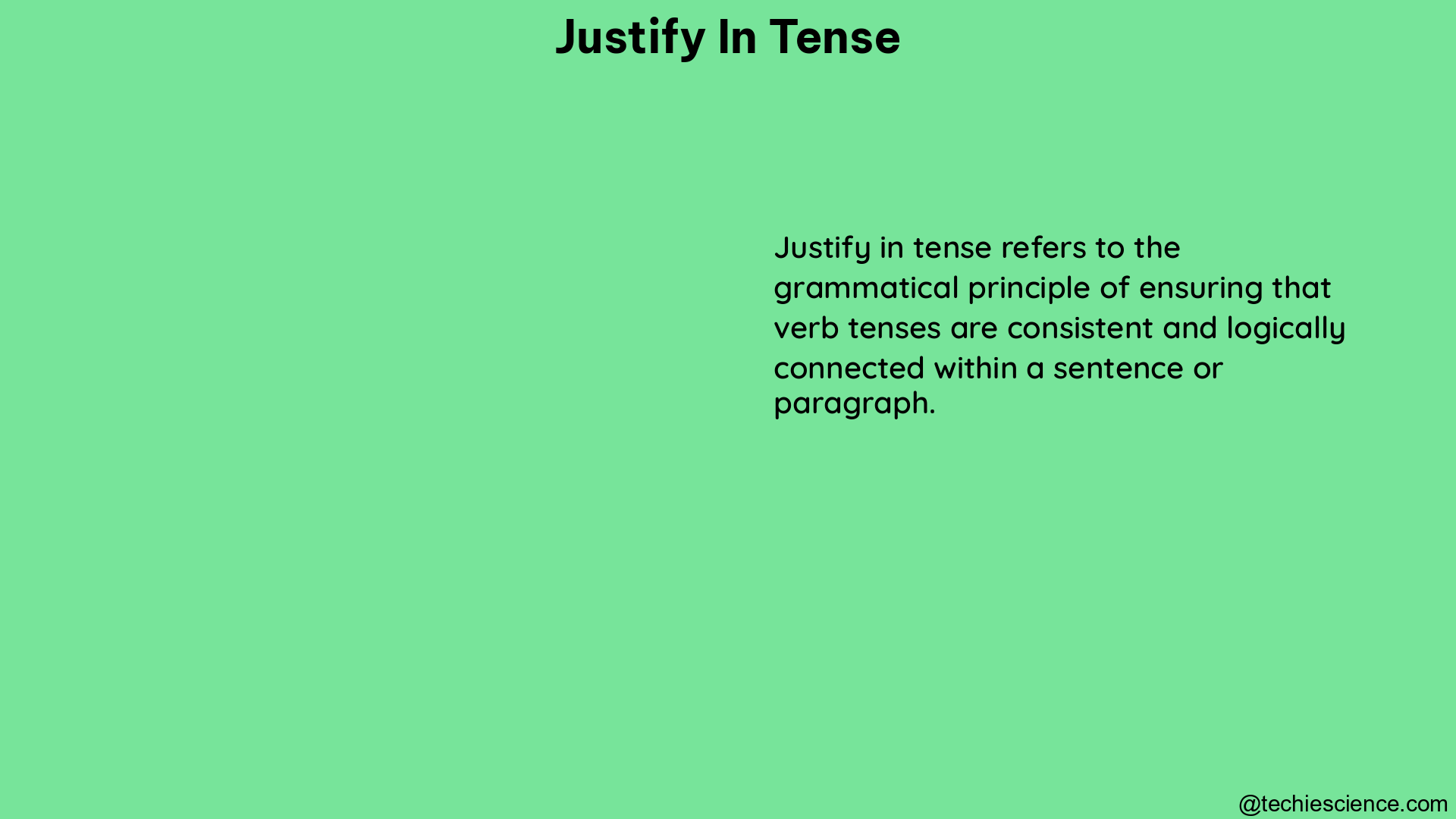The verb “justify” is a versatile and essential part of the English language, allowing us to express a wide range of actions and states. From describing habitual behaviors to conveying completed actions, the conjugation of “justify” plays a crucial role in effective communication. In this comprehensive guide, we will delve into the intricate details of using “justify” in various tenses, equipping you with the knowledge to navigate the complexities of this dynamic verb.
Present Tense
Simple Present
The simple present tense of “justify” is used to describe general truths or habitual actions. It takes the following forms:
- I justify
- You justify
- He/She/It justifies
- We justify
- You justify
- They justify
Example: “The manager justifies the company’s financial decisions every quarter.”
Past Tense

Simple Past
The simple past tense of “justify” is used to describe completed actions in the past. The conjugation is as follows:
- I justified
- You justified
- He/She/It justified
- We justified
- You justified
- They justified
Example: “The team justified the need for additional resources during the project review.”
Past Participle
The past participle of “justify” is “justified” and is used in combination with auxiliary verbs to form the present perfect, past perfect, and future perfect tenses.
Example: “The CEO has justified the company’s expansion strategy to the board of directors.”
Present Participle
The present participle of “justify” is “justifying” and is used in combination with auxiliary verbs to form the present continuous and present perfect continuous tenses.
Example: “The marketing team is justifying the new advertising campaign to the executive committee.”
Continuous Tenses
Present Continuous
The present continuous tense of “justify” is used to describe an ongoing action. The conjugation is as follows:
- I am justifying
- You are justifying
- He/She/It is justifying
- We are justifying
- You are justifying
- They are justifying
Example: “The sales manager is justifying the price increase to the customers.”
Past Continuous
The past continuous tense of “justify” is used to describe an ongoing action in the past. The conjugation is as follows:
- I was justifying
- You were justifying
- He/She/It was justifying
- We were justifying
- You were justifying
- They were justifying
Example: “The team was justifying the project timeline to the client during the meeting.”
Future Continuous
The future continuous tense of “justify” is used to describe an ongoing action in the future. The conjugation is as follows:
- I will be justifying
- You will be justifying
- He/She/It will be justifying
- We will be justifying
- You will be justifying
- They will be justifying
Example: “Next month, the HR manager will be justifying the new employee benefits package to the staff.”
Perfect Tenses
Present Perfect
The present perfect tense of “justify” is used to describe an action that started in the past and continues up to the present. The conjugation is as follows:
- I have justified
- You have justified
- He/She/It has justified
- We have justified
- You have justified
- They have justified
Example: “The team has justified the need for additional resources to complete the project on time.”
Past Perfect
The past perfect tense of “justify” is used to describe an action that was completed before another action in the past. The conjugation is as follows:
- I had justified
- You had justified
- He/She/It had justified
- We had justified
- You had justified
- They had justified
Example: “By the time the meeting started, the manager had justified the budget proposal to the executives.”
Future Perfect
The future perfect tense of “justify” is used to describe an action that will be completed at a specific point in the future. The conjugation is as follows:
- I will have justified
- You will have justified
- He/She/It will have justified
- We will have justified
- You will have justified
- They will have justified
Example: “By the end of the quarter, the sales team will have justified the new product launch to the customers.”
Other Forms
Modal Verbs
“Justify” can be used in combination with modal verbs like “can,” “could,” “may,” “might,” “shall,” “should,” “will,” and “would” to express different degrees of possibility, obligation, or permission.
Example: “The manager may justify the budget increase to the board of directors.”
Contractions
Contractions can be formed using “justify” with auxiliary verbs like “have” and “be.”
Example: “The team’s efforts have justified the investment in the new technology.”
Examples
- Simple Present: “The company justifies its environmental policies to the public every year.”
- Simple Past: “The CEO justified the decision to restructure the organization.”
- Present Continuous: “The marketing team is justifying the new advertising campaign to the executive committee.”
- Present Perfect: “The project manager has justified the need for additional resources to complete the project on time.”
- Future Perfect: “By the end of the fiscal year, the finance department will have justified the budget proposal to the board of directors.”
Reference:
- https://simple.wiktionary.org/wiki/justifies
- https://conjugator.reverso.net/conjugation-english-verb-justify.html
- https://www.theconjugator.com/english/verb/to%2Bjustify.html
- https://www.wordreference.com/conj/enverbs.aspx?v=justify
- https://en.bab.la/conjugation/english/justify

Hi…. I am Goutam Datta. I have completed a double M. A. in English and B. Ed. I am a creative writer. Currently, I am a part of the LambdaGeeks.